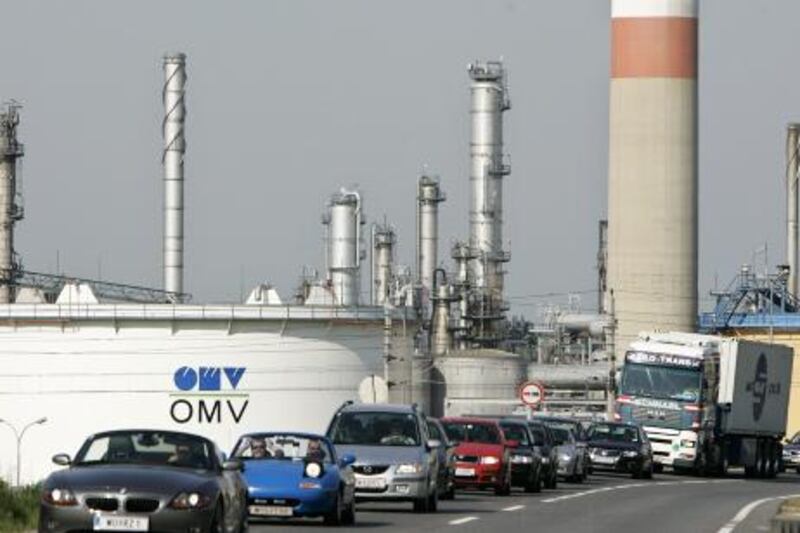Oil has been struck in Iraqi Kurdistan by the Austrian petroleum group OMV, which is partly owned by an Abu Dhabi sovereign wealth fund.
OMV, in which the International Petroleum Investment Company holds a 20 per cent stake, said its Bina Bawi 3 well had encountered hydrocarbons in one of the primary reservoir targets. The company said it planned to investigate further.
"We are very pleased to announce this discovery of oil. It seems good quality oil and it was flowing to the surface following a drawdown test," said Jaap Huijskes, the OMV executive board member responsible for exploration and production. "We are now going to continue drilling but I am confident that the final results will be promising."
WesternZagros, a Canadian oil and gas exploration company that focuses on Kurdistan, on Thursday announced an oil discovery in the region's Jeribe rock formation. Light crude flowed from its Sarqala-1 exploration well at a stabilised rate of 6,000 barrels per day (bpd) over a 24-hour test period, the company said. The well did not require stimulation and no water was produced with the oil.
"We're very excited to confirm an oil discovery in the Jeribe formation. With these encouraging initial results, we will continue the testing to evaluate the full flow capability at the well and its potential for early production," said Simon Hatfield, the chief executive of WesternZagros.
The new oil strikes are the second and third this year in the semi-autonomous Kurdish region of north-east Iraq.
In April, the US oil firms Aspect Energy and Marathon Oil found oil with their Altrush-1 well, about 90km north-west of Erbil, the Kurdish regional capital. Flow rates of 6,000 bpd were established during tests, the companies said.
All the operators have signed production-sharing contracts with the Kurdistan regional government. But those agreements are at the centre of a protracted dispute between Erbil and Baghdad that continues to cloud the outlook for sustained crude exports from the region and whether foreign oil producers will get paid.
Nevertheless, Iraq's oil ministry is under pressure to deliver substantial incremental oil exports and may need to accommodate the Kurds to meet near-term targets, analysts say.
The new discoveries could bring an increased sense of urgency to negotiations aimed at unlocking the impasse.
A "grand bargain" with the Kurds was at the heart of a political deal to return the Iraqi prime minister Nuri al Maliki to power last year, after indecisive national elections left Iraq without a government for months.
The Kurdistan regional government's price for supporting Mr al Maliki was understood to have included recognition of the region's autonomy over its natural resources, especially oil and gas.
That would entail recognition of the regional government's right to issue oil and gas contracts within its territory on its own terms.
In February, analysts took the re-start of Kurdish oil exports, which had been suspended for more than a year over the dispute with Baghdad, as a sign that the grand bargain had started to function.
Only two Kurdish oilfields, the Tawke field operated by the Norwegian firm DNO International and the Tak Tak field developed by Turkey's Genel Enerji and China's Sinopec, are pumping crude for export. DNO, which is 30 per cent owned by the private Ras al Khaimah company RAK Petroleum , received its first payment for oil from Iraq's finance ministry last month. But it is still unclear whether the producers will be allowed to earn a profit or will merely be reimbursed for development costs.
Even without such an agreement, analysts have interpreted the recent developments as a sign of improving relations between the Kurds and Baghdad, pointing to an eventual resolution of their dispute. Crucially, that would allow the passage of a long-stalled Iraqi federal oil law, which many consider essential to the orderly development of Iraq's vast oil potential.
Standing in the way of such legislation, however, is Dr Hussein al Shahristani, the Iraqi deputy minister for energy issues. Dr al Shahristani has stuck to his view that all Iraqi oil contracts should be subject to central government approval - a position the Kurds find unacceptable. In his previous role as Iraq's oil minister, he declared the Kurdish oil contracts "illegal".
OMV has stakes in five Kurdish oil and gas exploration blocks. It also has a 10 per cent interest in the region's Pearl Petroleum gas development project, led by Sharjah's Crescent Petroleum and Dana Gas.





